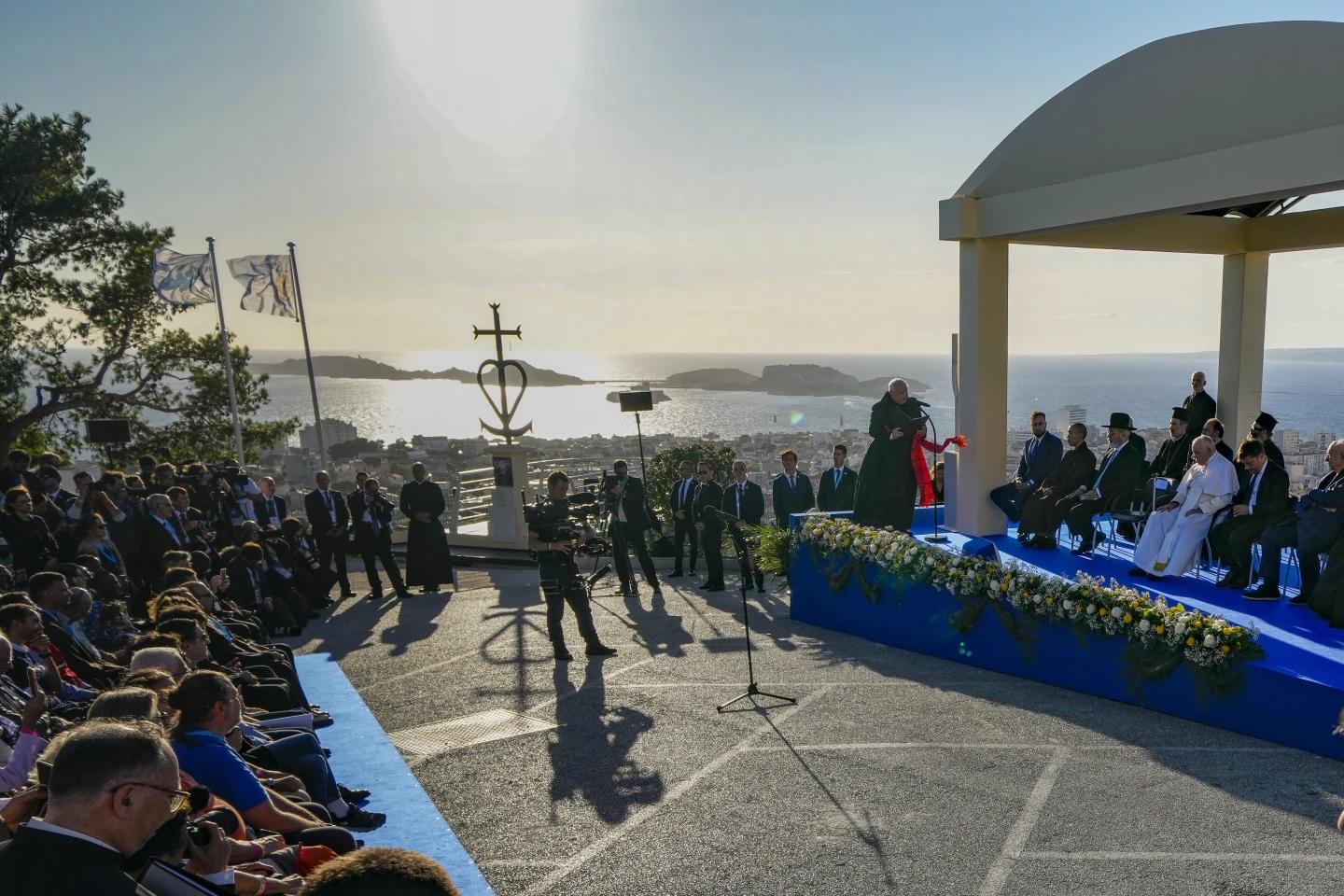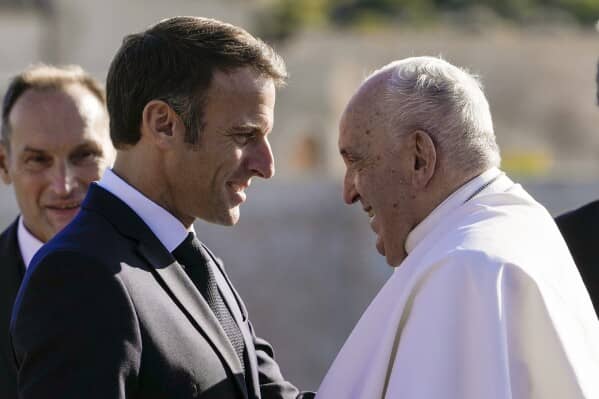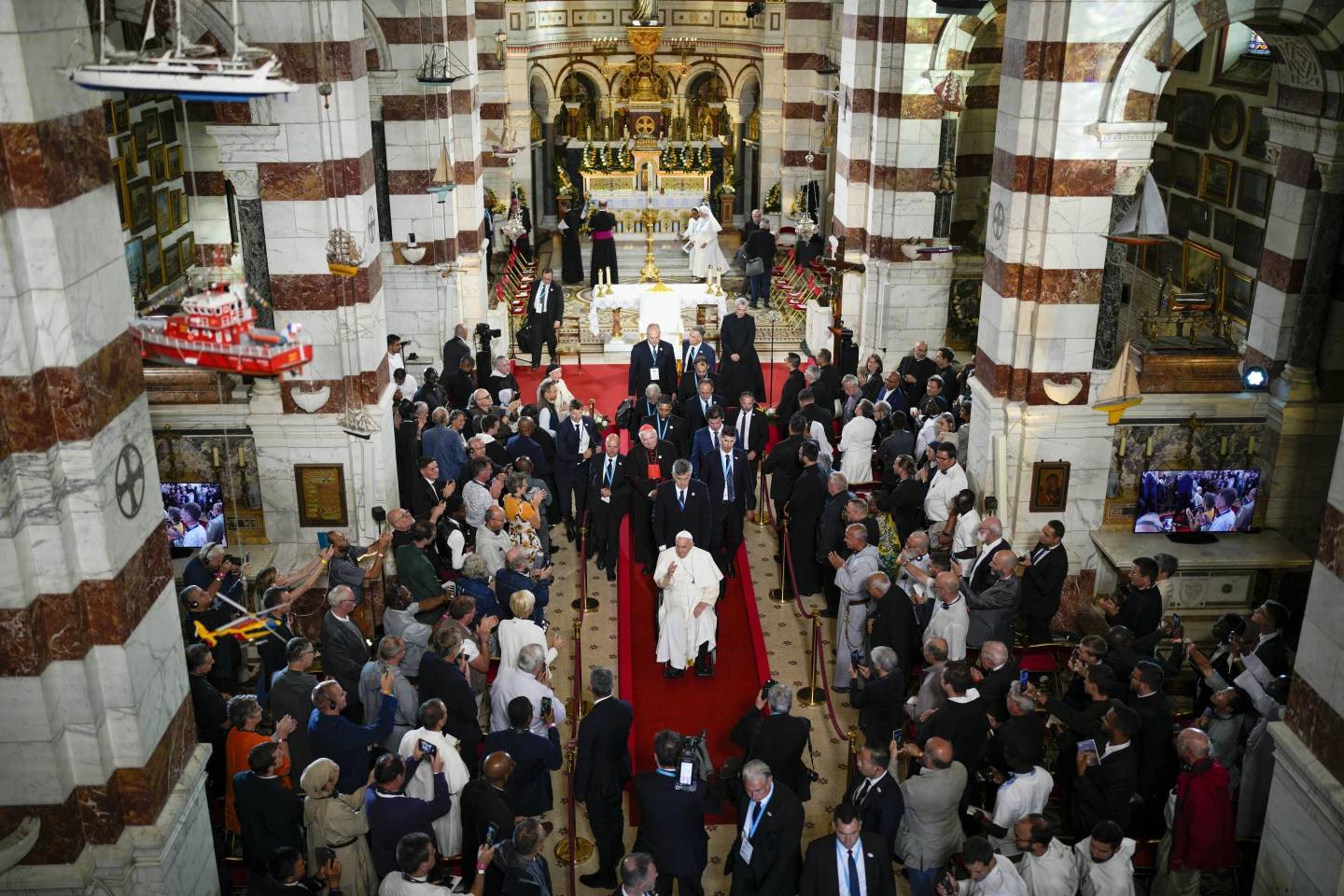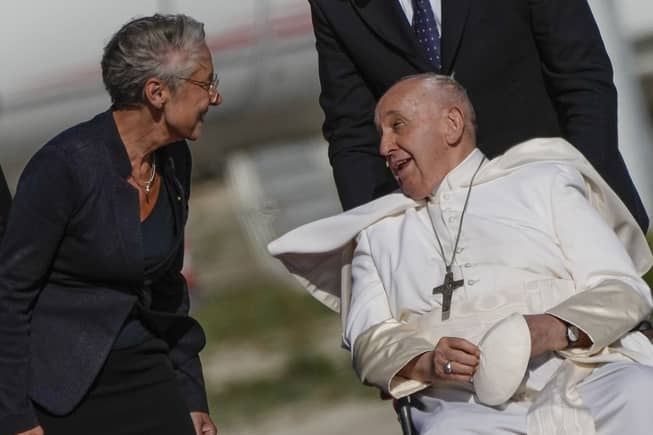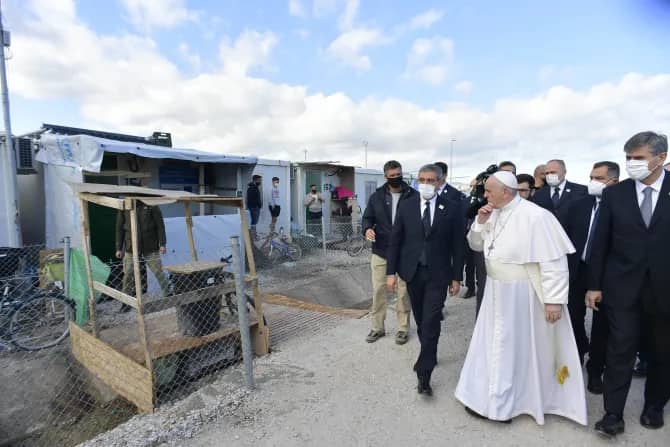MARSEILLE – After a week of rising tensions within Europe amid a surge in migrant arrivals, with some countries, including France, taking measures against asylum seekers, Pope Francis in Marseille Saturday challenged “alarmist propaganda” over immigration and advocated for a unified equitable reception policy.
While the port of Marseille is a gateway to France and Europe, some countries have chosen to try to close their doors, the pope said at the Sept. 23 close of the Rencontres Méditerranéennes taking place in Marseille this week.
For those countries that have barred new migrant arrivals, Francis said, “There were two words that resounded, fueling people’s fears: ‘Invasion’ and ‘emergency.’”
“Yet those who risk their lives at sea do not invade, they look for welcome,” he said, saying migration “is not so much a short-term urgency, always good for fueling alarmist propaganda, but a reality of our times, a process that involves three continents around the Mediterranean and that must be governed with wise foresight.”
To this end, he advocated for “a European response capable of coping with the objective difficulties.”
Francis repeated the Vatican’s four-stage approach to migrants: Welcome, protection, promotion and integration, saying the primary criteria when it comes to the migrant issue “cannot be the preservation of one’s own well-being, but rather the safeguarding of human dignity.”
“Those who take refuge in our midst should not be viewed as a heavy burden to be borne: If we consider them instead as brothers and sisters, they will appear to us above all as gifts,” he said.
Noting that this Sunday the World Day for Migrants and Refugees will be observed, he urged citizens to let themselves be moved by the plight of those “who have the right both to emigrate and not to emigrate, and not become closed in indifference.”
“History is challenging us to make a leap of conscience in order to prevent a shipwreck of civilization,” he said, insisting that “the future will not lie in being closed, which is a return to the past.”
Rather, “the solution is not to reject but to ensure, according to the possibilities of each, an ample number of legal and regular entrances.”
“This would be sustainable with an equitable welcome on the part of the European continent, in the context of cooperation with the countries of origin,” he said.
Pope Francis’s Sept. 22-23 overnight visit to Marseille for a third edition of the Rencontres Méditerranéennes, or “Mediterranean Meetings,” takes place amid a spike in tensions within Europe on the issue of migration following a surge of new arrivals.
So far this year, around 127,000 migrants have arrived in Italy, almost double compared to the same period last year, with over 2,000 people having died this year in their attempt to cross from North Africa to Italy and Malta, according to the UN migration agency.
Last week alone, 8,500 people arrived on the Italian island of Lampedusa, numbering more than the island’s entire population, in 199 boats, angering locals and eliciting promises of a fresh crackdown from Italian and EU leaders.
France last week ordered the number of soldiers at its border with Italy to be doubled in a bid to crack down on illegal crossings – a decision that is likely to come up during the pope’s private meeting with French President Emmanuel Macron Saturday.
Meanwhile, Germany also decided to suspend a voluntary agreement with Italy to take in migrants, accusing the Italian government of failing to live up to its obligations under the EU’s Dublin Regulation, which outlined criteria for which EU states are responsible for examining an asylum request.
In July, EU Commissioner Ursula Von der Leyen, Italian Prime Minister Giorgia Meloni and Dutch Prime Minister Mark Rutte signed a pact with Tunisia aimed at stemming the flow of migrants from Tunisia into Europe, which had become one of the preferred routes for smugglers in Africa, given that Libya is now considered too dangerous.
After his arrival in Marseille Friday, Pope Francis condemned what he called a “velvet gloved” indifference toward migrants as well as EU policies punishing rescue vessels that assist migrants in distress, calling these “gestures of hatred.”
Speaking at the closing session of the Rencontres Méditerranéennes – which has drawn 60 representatives of churches from the five shores of the Mediterranean Sea, and around 60 young people from the same areas Saturday morning – the pope said that when it comes to the migrant issue, simply crying “enough” or attempting to save oneself “will turn into tragedy tomorrow.”
Integration is needed to ensure a better future, he said, “Otherwise, they will censure us if we favor only sterile forms of assimilation,” he said.
Francis stressed the importance of investing in the integration of migrants, saying mere assimilation “that does not take into account differences and remains rigidly fixed in its own paradigms only makes ideas prevail over reality and jeopardizes the future, increasing distances and provoking ghettoization, which in turn sparks hostility and forms of intolerance.”
“We need fraternity as much as we need bread,” he said.
Francis said the Mediterranean, which ought to be a source of life, has instead become “the graveyard of dignity: it is the stifled cry of migrant brothers and sisters.”
He also condemned the growing disparity between affluence and poverty in the region, saying the role of the Church is to prioritize human dignity and to spread a culture of encounter.
“We cannot accept that the paths of encounter should be closed, that the truth of mammon should prevail over human dignity, that life should turn into death!” he said, saying, “We are not called to grieve over times past, or to redefine the Church’s role in society; we are called to bear witness.”
“May the Church be a port of hope for those who have lost their confidence,” he said.
Pointing to Marseille’s diverse religious and cultural background, he said the Mediterranean Sea itself is a “place of encounter.”
As a crossroads between east and west, north and south, the Mediterranean “brings together the challenges of the whole world. It is an outpost of challenges that concern everyone.”
It is also “a hotspot where changes are felt more quickly,” he said, referring to the warnings of experts on climate change.
With many areas of the Mediterranean experiencing war and violence, “a global vocation to fraternity” is the only way “to prevent and overcome” these conflicts, the pope said, saying the Mediterranean must be “a laboratory of peace” where people come together based on a common humanity, “and not on the basis of contrasting ideologies.”
“How greatly we need this at the present juncture, when antiquated and belligerent nationalisms want to make the dream of the community of nations fade!” Francis said, repeating his frequent criticism of nationalist populism.
He said the poor must be prioritized and not seen as “troublesome problems,” but they must be welcomed and integrated.
Pope Francis again voiced concern over Europe’s falling birthrate and the practice of euthanasia, saying, “Who cares for the frightened families, afraid of the future and of bringing children into the world?”
“Who listens to the groaning of our isolated elderly brothers and sisters, who, instead of being appreciated, are pushed aside, under the false pretenses of a supposedly dignified and ‘sweet’ death that is more ‘salty’ than the waters of the sea?” he asked.
French law currently prohibits euthanasia. A law passed in 2016 allows doctors to keep terminally ill patients sedated before death but stops short of permitting assisted suicide and euthanasia.
Francis also condemned anti-Christian persecution still present in several Mediterranean countries, saying many choose to leave their homelands either due to discrimination, violent persecution and the lack of full citizenship and equal rights.
In terms of the role that the various churches can play, the pope suggested the creation of the Mediterranean Bishops’ Conference, saying such a body “could offer greater possibilities for regional dialogue and representation.”
“A specific pastoral plan that is even more interconnected” is needed, so that dioceses most exposed to the migrant crisis “can provide the best spiritual and human assistance to our sisters and brothers who arrive there in great need.”
Noting that there are 60 young people participating in the Rencontres Méditerranéennes alongside the 60 church leaders from varying traditions, Pope Francis said the role of young people is essential in building a better future, based on encounter and rejecting “fundamentalist rhetoric.”
He closed urging attendees to be “a sea of good, in order to confront the poverty of today in solidarity and cooperation; be a welcoming port, in order to embrace all those who seek a better future; be a lighthouse of peace, in order to pierce, through the culture of encounter, the dark abysses of violence and war.”
Follow Elise Ann Allen on X: @eliseannallen
